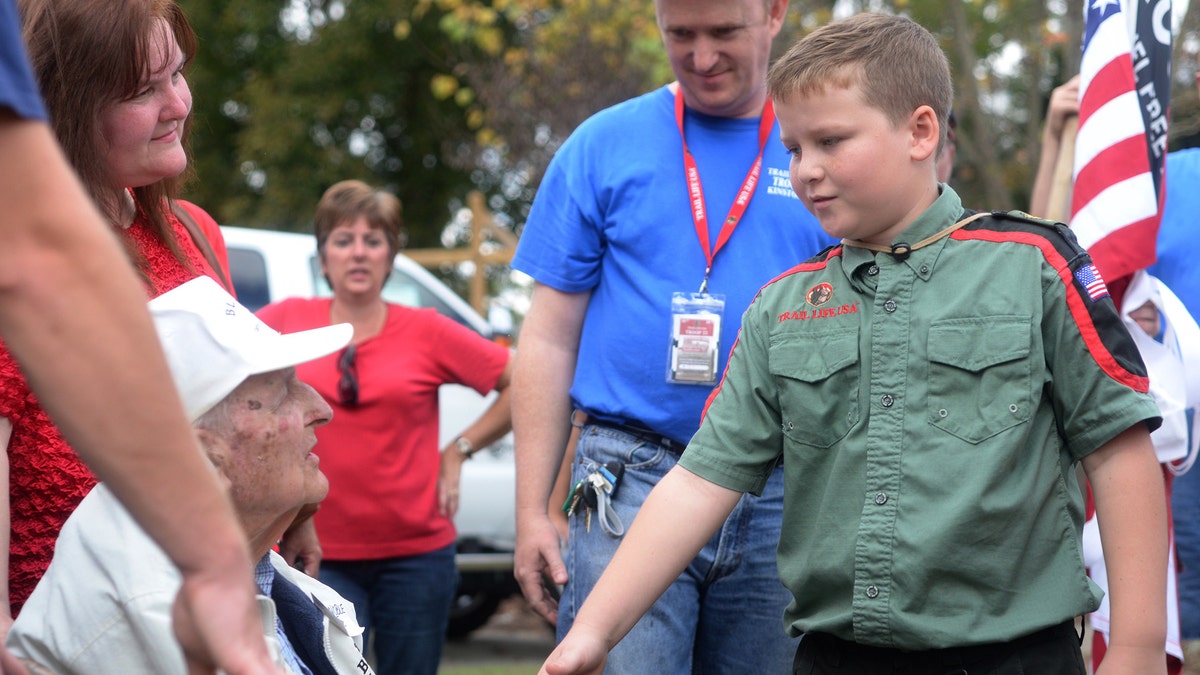
Nov. 7, 2015: Jackson Cannon, 10, of Trail Life USA-Troop 33, shakes hands with World War II veteran Ernest Noble, 95, during a Veteran's Day ceremony at Pearson Park in Kinston, N.C. Noble fought in Belgium, Luxemburg, Holland and Germany. In March of 1945 he helped liberate concentration camps. (Zach Frailey/Daily Free Press via AP)
Until a few years ago, every November I called an old man named John Moorhead and wished him a happy Veteran's Day.
"Thank you, Josh-ah," he would say in his twangy Mississippi accent, and then we would talk about his health, my faith, and how his grandkids were doing.
I met "Uncle John," as I called him, back in college. He and I worked together at a clinic in Hattiesburg, Mississippi, where we ran errands and pushed people down the hallway in wheelchairs. He always treated me special, because he said I reminded him of his old friend "Satch," who died fighting alongside him in World War II. I felt honored.
It wasn't long after I started working with Uncle John that I noticed something about him: When doors slammed, he jumped. So one day, I asked him about that, and he flippantly said it went back to his days fighting in Iwo Jima during World War II.
Did you go get his body?" I asked. "There wasn't nothing to get," said John. "He stepped on a landmine. So I just went and found one of his hands, and then I picked it up and loved him."
"Oh, man, that must have been awful," I said, realizing he was probably describing a symptom of post-traumatic stress disorder.
He shrugged it off and said something about how much he resented military men who "went around crying and carrying on" about their years of combat. He said didn't need special recognition for doing his job.
But when Veteran's Day rolled around each year, I could tell it meant a lot that I remembered to thank him for what he did for our country — especially when I remembered to say I was grateful for his old friend Satch as well.
I could tell that the loss of Satch still troubled Uncle John, and it was during one of our last Veteran's Day calls that I figured out part of the reason why.
"Were you there when Satch died?" I asked Uncle John.
"Yes, I was."
"Did you go get his body?" I asked.
"There wasn't nothing to get," said John. "He stepped on a landmine. So I just went and found one of his hands, and then I picked it up and loved him."
"Oh, I see," I said quietly. "I'm so sorry."
Even today as I write Uncle John's words, my eyes water up. They serve as a reminder of the many men and women who have served our country in battle, only to come home with all kinds of shattered innocence.
Like Uncle John, many of them put on a tough front and say things like, "I was just doing my job," but deep inside they know the price they paid. And although we'll never fully understand what they've been through, the least we can do today is pick up the phone, call them, and say thank you.
We'll never know what it means to them.
